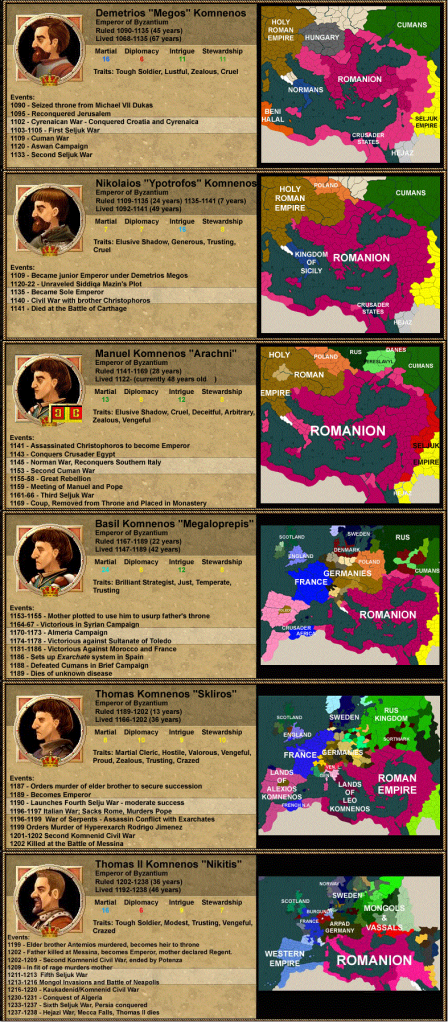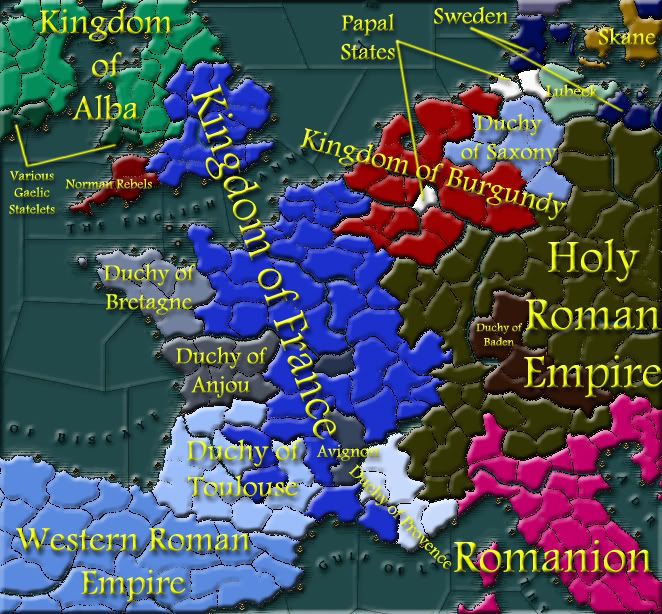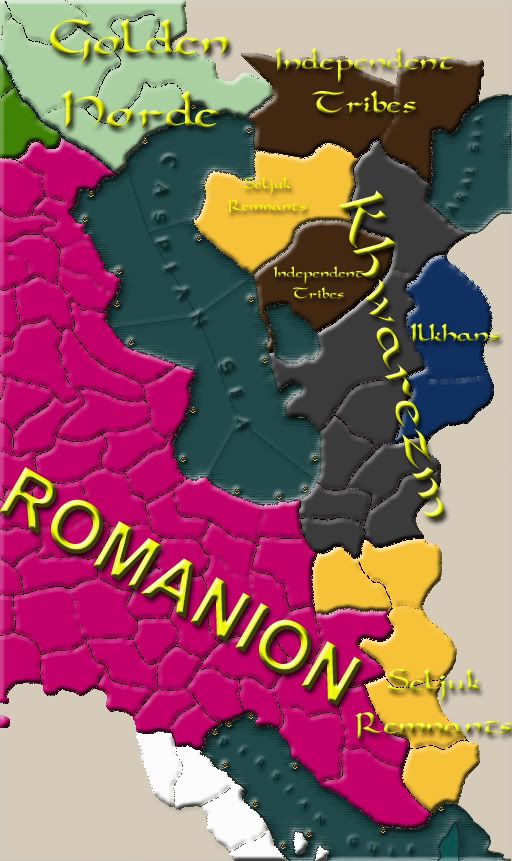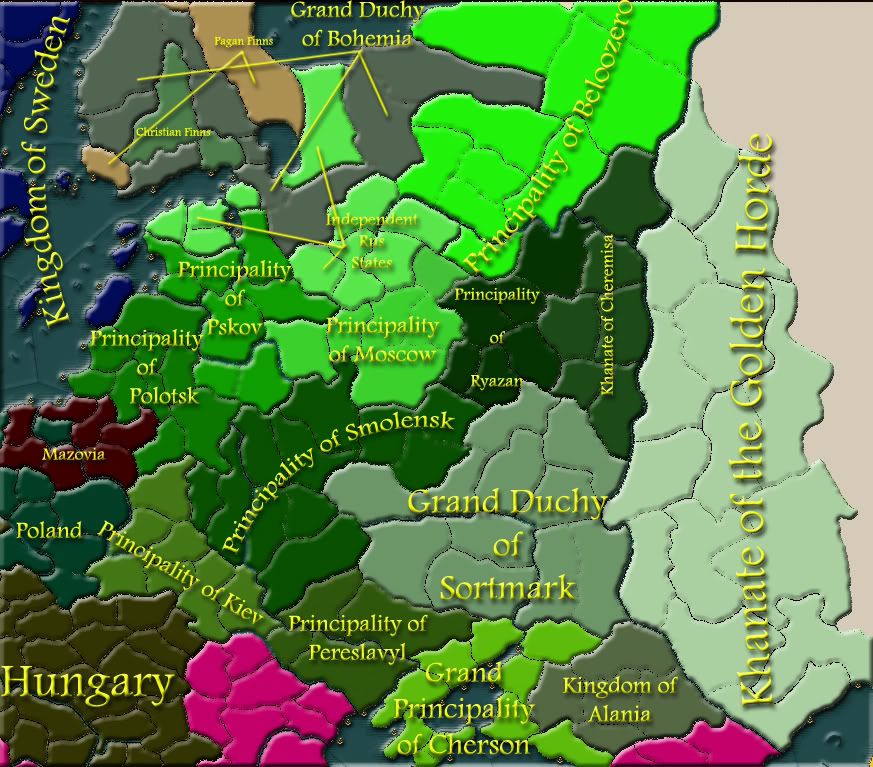Enewald – Maybe not Imperial armadas (they’d still need to build a naval base, etc.), but there’ll likely be some action of some kind if the problem persists.
Laur – By this point, I’d given up buffing the Mongol khanates. They clearly weren’t using the troops I ‘gifted’ them properly, so it was all in all a lost cause. Kind of ironic though, that in this timeline its Khawrezm kicking out the Mongols, instead of the reverse.
 Servius Magnus
Servius Magnus – It’d probably depend on who was referring to Alexios. Alexios might be known as ‘the Exile’ to loyalists later on in the Fifth Empire, or ‘the Latin’ or ‘the Spaniard’ to those who use those words disparagingly against him…
Ksim3000 – I think you might be a Scotsman in this timeline, assuming the Scots hold all that land!
asd21593 – I’ve got more on the way!
Carach – More than likely some Norman who was kneeling before the French King—for now…
AlexanderPrimus – I’m going to have some fun with Khwarezm, since they’re there…
Nikolai – More about the Golden Horde will be explained below…
If one wishes for a life of ease and comfort, the lands of the former Rus’ kingdom are
not the place to seek retirement. However, if one is an ambitious, avaricious, greedy or simply power-hungry, this is a land of your dreams. For many, the freshly tilt blood of the Russian lands is now a land of opportunity for wealth, power, extortion and greed.
Like the Mid-East, the lands of the Rus were profoundly affected by the sudden onslaught of the Mongols in the 1210s, and even more dramatically the Mongol withdraw in the 1230s. However, unlike the Central Asian plains where Khwarezm holds a regional advantage over the Ilkhantate, the Golden Horde is still by far the most powerful state in the Russias. The Horde was forced back due to Jochi’s defeat in the first of what was to be many Mongol civil wars—at the disastrous battle of the Ural River, Jochi lost two of his three
tumen, as well as his own life. Ogedei promptly seized Jochi’s
ulus, and handed the lands to their brother Batu, who has since shown himself almost more Roman than Mongol.
Faced with administering a large, unruly territory that stretched from central Russia to the Siberian steppes, Batu took stock of what was strategically most important to the Golden Horde—the Volga trade between Scandinavia and Central Asia. Deeming the Dnepr and other rivers too far away and indefensible for their weakened forces, the Horde was content to pull back the lands under its direct control to the east of the Volga. In place of direct rule, however, Batu executed one of the more brilliant political moves made by a descendant of Genghis—he offered the land up to petty lords, warriors and criminals, with the intent of keeping all of the Rus fractious, divided, and eager for the patronage of the [still] most powerful force in the region, aside from the perennially distracted Romans.
The end result is a vast swath of land, stretching from Poland to the remains of Novgorod to Kiev to the Volga, that is rudderless and leaderless—a fact that many adventurers from the lands of the Rus and beyond have taken note.
Perhaps the wildest and most ambitious of these is “King” Vaclav of “Bohemia.” The self-styled King served for many years as a sellsword in the German civil wars, fighting first for the von Frankens, then the Walhausens, then the Arpads, and finally back to the von Frankens. Vaclav’s frequent change of employers rendered his promises of loyalty to the new Arpad regime dubious at best, and he and his 4,500 strong band were forced out by Emperor Kalman in 1233. Their reputation was infamous even as far as the Rus vassals of the depleting Golden Horde, who refused his services (and, in the case of Polotsk, greeted his ships with their army drawn up in line of battle on the beach). Vaclav eventually landed on the shores of Finland, a land of mixed pagan and Christian peoples incapable of resisting his forces. By 1238, Vaclav’s impromptu realm now stretches over a confusing swath of northernmost Russia and southern Finland, his lands intermixed with vassal Christian and pagan Finnish tribesmen. The wayward warlord has set up his capital just outside the ruins of the former Rus fortress capital of Velikiy Novgorod—he has gone so far as to name the city Nove-Novgorod. Official recognition came when a distant cousin of Batu, during negotiations on trade, referred to Vaclav as the ‘Grand Duke’ of the region.
Southeast and southwest of him lie numerous independent Rus city-states, their status protected (distantly) by promises of support from the
Khan of the Golden Horde. However, many of these cities are small, barely recovering from Subotai’s famous raid through the region 20 years before. It remains to be seen if the Horde will truly care if one of the neighboring Princes nibbles at these lands—however, it is likely the Horde would instigate a coalition of Princes to oppose anyone who nibbled
too much.
The original three Rus vassals of the Horde—Pskov, Polotsk, and Smolensk—are still going strong. Of the three, Smolensk remains the strongest by far. Indeed, the Prince of Smolensk is still officially styled ‘Grand Prince of All the Rus’ by the Khan in Sarai. While Polotsk has been, and likely will remain, the weak brother of the three, Pskov has begun to gain an array of power around itself, mostly in response to the threat posed by Vaclav and his growing sellsword-Finnish realm to the north.
Pskov’s principal ally is one of several new Principalities created by the Mongols during their withdraw—the Principality of Moscow. Weak, with few people and fewer troops, the Princes of Moscow need Pskov’s support if their realm is to remain safe from the covetous eyes of Smolensk. Pskov knows that, given time, Moscow could become a formidable force in its own right—better to tame them early as an ally than let them grow into a potent rival.
Two other Principalities were created in the north by the retreating Mongols. The Princes of Beloozero inherited vast swaths of forest with little farmland yet a profitable timber and trapping industry. Amongst the Rus they have most quickly moved to fill the trading gap left by the destruction of Velikiy Novgorod. Beloozero, a ghost town in the immediate aftermath of the Mongol invasion, has completely flipped towards being a boomtown. Estimates are that in 1238 some 9,000 people live in, over, under, and outside her dilapidated walls. With trade agreements built on cozying up to the Khan, the Prince has gained funds to start building a stone church, as well as stone walls around his haphazard but rapidly growing capital (which, despite his realm's name, is quite a distance from the previous town of Beloozero).
The Princes of Ryazan have not been so fortunate in their few years of independence. Just as weak as the other new princes, they do not enjoy the distance from the Khan Moscow has, or the wealth flowing into Beloozero. Instead they lie directly next to a small
ulus created for the children of Jamuqa, at the insistence of Ogedei Khan himself. The Khanate of Cheremisa serves as the spearpoint of Mongol domination of the region—often launching raids for plunder into disloyal lands at the behest of the Khan in Sarai. Ryazan lies directly next to Cheremisa, and her harried Prince often has to ‘host’ Cheremisian raids too and from their official target.
Further south, old lives alongside new in the ‘post’ Mongol Russia. The Voivodes of Volhynia have since reoccupied the old
theme capital of Kiev, and declared themselves Princes of the same. While they were the first target of a Cheremisian raid in 1237, they have persisted in their claim to this ancient, and potent title. Rumors state that Batu is considering mobilizing his
tumen to move into the region in a massive show of force, but Kiev is far from the depleted Golden Horde—time will tell if her distance can keep her safe.
Further to the east, Sortmark continues her remarkable and fortunate existence. The Kingdom of the South Danes faced complete and utter destruction in 1216 in the aftermath of Neapolis—her
Krigleder had been slain, along with many of her fighting men, and her capital had been burned. Alone amongst the peoples of the Rus steppe, however, the Mongols had been impressed with the Danes. Consequently, Genghis Khan in 1217 made them an offer they simply couldn’t refuse—deliver a quota of fighting men to the service of the Khan on an annual basis as well as annual tribute, and the Mongols would not decimate the realm and wipe it from the face of the earth. Against the complaints of many of his
jarls, King Knud VI knelt, becoming Grand Duke Knud.
Since that time, the Danes have loyally, if reluctantly, acted as the Mongol ‘policeman’ in the southern areas of the Rus, even past Jochi’s demise and the rise of Batu. Twenty years have given the Danish army time to regroup, and a new generation of
huscarls and horsemen now fill their ranks. So far, the older, wise Knud has remained loyal to the new Khan, but times always change. Sortmark alone has the strength to potentially pose a challenge to the Golden Horde, should she gather sufficient allies around her banner. However, all the Rus states around her have been carefully goaded to hate the Danes… the Mongols also know where the power in the south lies, and have been keen to keep the formidable Danish army in check.
Along the shores of the Black Sea, the Mongols had a totally different challenge on their hands. These regions had, for the past century, been under the banner of the powerful Roman Empire. While urbanized areas such as Cherson were Greek through and through, more outlying areas retained either their own local culture, or in other cases, a mishmash of Greek and native ideas and traditions. Jochi, in drawing up his plans for the area, administered this area as separate from the lands of the Rus. The Khan tore down the Roman
theme system in the region altogether, deeming its organization a potential threat to Mongol overlordship. In its place, he promoted three principalities with arbitrary borders—Pereslavyl to the west, Cherson in the middle, and Alania in the East.
Like the Rus, the Mongols designated one of the Princes, in this case Cherson, as ‘Grand Prince and Direct Overseer of the Coast on Behalf of the Great Khan.’ For Jochi, this killed many birds with a single stone—the most powerful of the Princes was bought into the Mongol bureaucracy, buying loyalty and arraying the other princes, and most importantly, the Roman state, against them. With a border next to Sortmark, the Mongols also encouraged a rivalry between Cherson and the Danes, using each to help keep the other in check. The system has worked well for two decades, even during the chaos of Jochi’s fall and Batu’s arrival in Russia.
However, problems exist here as well. Perhaps foolhardy, the Prince of Alania declared himself successor to the defunct title ‘King of the Alans’ in 1237. The new monarch was very careful, however, to send an ambassador to Sarai clarifying that his new kingly status did not mean he was superior to the Khan, nor did it mean he intended to break free of Sarai’s orbit. Batu Khan has yet to make a reply by pen or sword to this, but time will tell how things will develop…








